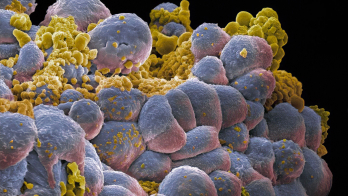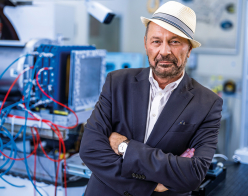Harry McConnell, director of the Interactive Health Network and chief executive officer of the International eHealth Association, explains why communication technologies are so important for health and development in Africa.

Mozambique was the host to an extraordinary event in July involving African heads of state, leading medical experts and major funding agencies for health and development. Uniquely, this interaction was part of a special session of the summit of the African Union, and the participants spoke from different venues around the world via communication technologies.
The incoming president of the African Union, President Chissano of Mozambique, presided over the conference, which saw African heads of state interacting with key stakeholders, including the World Health Organization (WHO), the World Bank, the UK Department for International Development, the US government and the Gates Foundation. This is the first time that heads of state have opened their doors to the world in such a way as a formal part of any international summit. The African Union showed tremendous initiative in leading the way on this, and the technology facilitated it in a way that increased the interaction and input from the major international agencies.
Mozambique also demonstrated its technological capacity to host such an event, using ISDN, several satellite systems and digital radio to link the summit, which was held in the capital Maputo, with 22 African nations, Geneva, London, New York, Washington, DC, and Dublin, via videoconference. Graça Machel moderated the discussion from Maputo. The Interactive Health Network organized the event, which was also broadcast around the world on the Web, radio and television. CERN participated with the WHO from Geneva, where CERN’s Manjit Dosanjh was in the chair.
The outcome of this unique combination of technology was a highly interactive session that resulted in a new declaration on the role of African states in combating HIV, malaria and tuberculosis. The Prime Minister of Mozambique, Pascoal Mocumbi, Peter Piot of UNAIDS and African heads of state representing each region, all gave key addresses on this important topic. President Olusegun Obasanjo of Nigeria outlined the role of the New Partnership for Africa’s Development (NEPAD), and President Yoweri Museveni of Uganda spoke of his country’s approach to reducing the incidence of HIV. The session showed a new way forward for governance and global interaction in setting policy for the critical issues in health and development.
As a follow up to this event, the Interactive Health Network and the International eHealth Association are collaborating with CERN in an effort to establish a pan-African health communications network for HIV, malaria and tuberculosis, with awareness, education, research, clinical care and effective policy implementation as central goals.
I see three key elements in this network. First, it should provide access to essential information on best practice and evidence-based medicine. International agencies currently rely mainly on information generated outside of Africa in making decisions. However, evidence-based practice in other countries does not necessarily apply to Africa. Exchange of information must occur between health professionals within Africa to ensure that the best information is available and used appropriately. This will require a unique integration of education, research and point-of-care access, with communication between researchers and clinicians that maximizes the experience of patients and clinicians working in their own environment in Africa.
A second key element is the prevention of illness through effective communication. The most effective public health initiatives so far have been led by Africans promoting measures to reduce the rate of infection at the grass-roots level. The Ugandan approach to the HIV epidemic is one such example. Radio, television and satellite can all be effective means of transmitting essential public health messages, giving communities the education they need to help themselves.
Thirdly, the network must facilitate meaningful policy making by empowering leaders. Policy makers and leaders can only make decisions based on the information available to them. Familiarity with the experiences of other healthcare systems can help avoid repeating the mistakes of others. Transparency and effective leadership are thus inseparable, and can be promoted through effective communications.

Africa has a unique opportunity to “leap-frog” its policies with respect to information and communication technologies (ICTs). It has the potential to benefit more than any other region from innovative ICT use in health. There are many underutilized networks in Africa that can make ICTs available in even the most remote areas, and their use can help to achieve health equity in Africa.
•CERN will host a conference in December to discuss the potential uses for ICTs in health and other fields. Co-organized by ICSU, TWAS and UNESCO, the Role of Science in the Information Society will precede the World Summit on the Information Society, as a side event to the summit.







